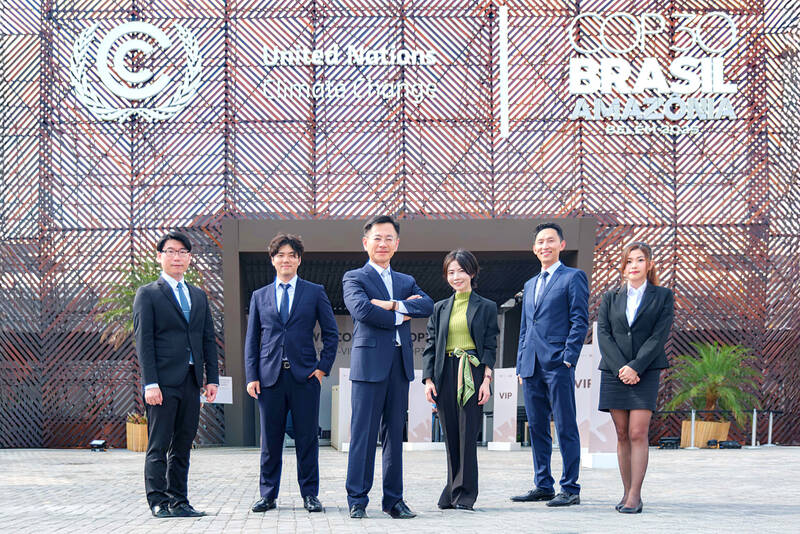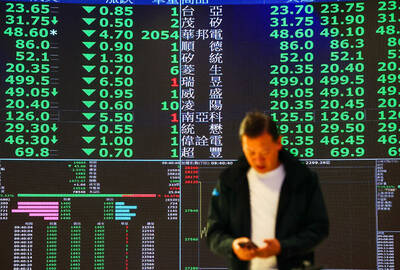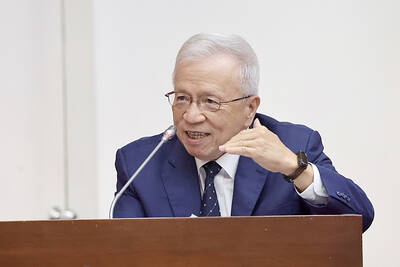E.Sun Financial Holding Co chief sustainability officer Louis L.Y. Chang (張綸宇), along with the dedicated sustainability team, represented E.Sun at the UN Climate Change Conference (COP30). At the World Climate Summit, Chang delivered a keynote speech titled: “Building Resilience: An Integrated Financial Approach to Climate Challenges.” His address highlighted E.Sun’s practical experience in driving low-carbon transition through financial innovation, underscoring the proactive role of Taiwan’s financial sector in global climate action.
This year’s COP30, held in Belem, Brazil, focused on “Implementation,” emphasizing climate finance, inclusive participation, and a just transition. Chang detailed the climate challenges facing Taiwan, including transition risks for vital supply chain component — small and medium-sized enterprises — which struggle with carbon management expertise and renewable energy access, and physical risks from extreme weather like typhoon-induced flooding.
As a member of the Coalition of Movers and Shakers on Sustainable Finance, E.Sun utilizes geographic information system tools to build a physical risk database and strengthen risk assessment. E.Sun has also helped develop standardized methodologies for financial sector carbon accounting, target setting and transition loan assessment. Chang’s speech led to a high-level panel discussion featuring senior leaders from the UN Global Compact, the Brazilian Development Bank, Santander Bank SA, the Green Finance Organization and McKinsey & Co.

Photo courtesy of E.Sun Financial Holding Co
E.Sun recently launched its “net zero transition plan” to enhance client and partner climate resilience. The plan centers on achieving net zero by 2050 by shifting to climate-aligned asset management. Using international sustainability taxonomy frameworks, E.Sun established a seven-tier “climate alignment system” to support sectors in transition. E.Sun facilitates step-by-step transformation — helping high-carbon companies progress to low-carbon operations — through tailored financial solutions, prioritizing engagement over exclusion.
Chang stressed that the essence of a “just transition” is to “leave no one behind,” with financial institutions playing a vital role in industrial transformation. E.Sun will continue to collaborate with stakeholders to advance climate mitigation and adaptation, creating sustainable value for future generations.
Details of the plan are available on the E.Sun Financial Holding Co’s official Web site — E.Sun Low-Carbon Transition Plan: https://www.esunfhc.com/en/-/media/ESUNFHC/Images/Home/environment/Net-Zero/transition-plan.pdf

JITTERS: Nexperia has a 20 percent market share for chips powering simpler features such as window controls, and changing supply chains could take years European carmakers are looking into ways to scratch components made with parts from China, spooked by deepening geopolitical spats playing out through chipmaker Nexperia BV and Beijing’s export controls on rare earths. To protect operations from trade ructions, several automakers are pushing major suppliers to find permanent alternatives to Chinese semiconductors, people familiar with the matter said. The industry is considering broader changes to its supply chain to adapt to shifting geopolitics, Europe’s main suppliers lobby CLEPA head Matthias Zink said. “We had some indications already — questions like: ‘How can you supply me without this dependency on China?’” Zink, who also

At least US$50 million for the freedom of an Emirati sheikh: That is the king’s ransom paid two weeks ago to militants linked to al-Qaeda who are pushing to topple the Malian government and impose Islamic law. Alongside a crippling fuel blockade, the Group for the Support of Islam and Muslims (JNIM) has made kidnapping wealthy foreigners for a ransom a pillar of its strategy of “economic jihad.” Its goal: Oust the junta, which has struggled to contain Mali’s decade-long insurgency since taking power following back-to-back coups in 2020 and 2021, by scaring away investors and paralyzing the west African country’s economy.

Tax revenue from securities transactions last month increased 41.9 percent from a year earlier to NT$30.3 billion (US$975.8 million), rising on an annual basis for the third consecutive month and marking the highest for the month of October as Taiwanese stocks continued to perform strongly, data released by the Ministry of Finance showed yesterday. Last month, the TAIEX surged 2,412.81 points, or 9.34 percent, marking its largest-ever monthly rise for October as market sentiment was buoyed by a nearly 15 percent gain in contract chipmaker Taiwan Semiconductor Manufacturing Co (TSMC, 台積電), which accounts for more than 40 percent of the

BUST FEARS: While a KMT legislator asked if an AI bubble could affect Taiwan, the DGBAS minister said the sector appears on track to continue growing The local property market has cooled down moderately following a series of credit control measures designed to contain speculation, the central bank said yesterday, while remaining tight-lipped about potential rule relaxations. Lawmakers in a meeting of the legislature’s Finance Committee voiced concerns to central bank officials that the credit control measures have adversely affected the government’s tax income and small and medium-sized property developers, with limited positive effects. Housing prices have been climbing since 2016, even when the central bank imposed its first set of control measures in 2020, Chinese Nationalist Party (KMT) Legislator Lo Ting-wei (羅廷瑋) said. “Since the second half of